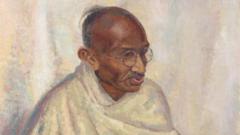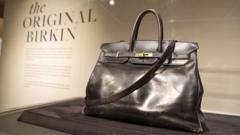India's cultural ministry asserts that the auction contravenes both national and international laws, prompting a call for the return of the sacred items.
India Demands Return of Sacred Jewels Tied to Buddha's Remains from Sotheby's Auction

India Demands Return of Sacred Jewels Tied to Buddha's Remains from Sotheby's Auction
India's government threatens legal action against Sotheby's over the auction of culturally significant jewels linked to Buddha's remains.
The Indian government has escalated its actions against Sotheby’s as it prepares for an upcoming auction of jewels associated with the remains of the Buddha. The auction is scheduled for Wednesday and features gems that were interred alongside bone fragments of the Buddha over a century ago. India's Ministry of Culture has issued a stern warning, stating that they will pursue legal routes unless the prestigious auction house halts the sale. They argue that this auction breaches both domestic and international legal frameworks as well as UN conventions, making a forceful case for the jewels to be recognized as sacred.
The jewels, which include a treasure trove of about 1,800 diamonds, sapphires, and other precious stones, were unearthed more than a hundred years ago in Piprahwa, an area near Lumbini, widely recognized as the birthplace of Buddha. The relics were excavated by William Claxton Peppé and subsequently turned over to the British colonial government, which transferred most relics to the Indian Museum in Kolkata, while some relic duplicates remained with the Peppé family. In a recent Instagram post, the Ministry of Culture accused Chris Peppé, the great-grandson of Claxton Peppé, of lacking any rightful authority to auction off these culturally significant relics and criticized Sotheby’s for contributing to ongoing colonial exploitation.
The ministry emphasized that the classification of these jewels as mere "duplicates" is misleading; they represent a significant historical and spiritual legacy for India. As part of their demands, the Ministry has requested a public apology from Sotheby’s and the Peppé family, along with full disclosure of ownership records pertaining to the relics. They have warned that a failure to comply would result in legal action, both in India and Hong Kong, and they might launch a public awareness campaign condemning Sotheby's actions.
In response to the Indian ministry's concerns, Chris Peppé articulated that while the family considered donating the relics to the Buddhist community, they faced numerous challenges, and opted for an auction as what they believed to be the most equitable approach for transferring these jewels. The Peppé family has previously exhibited these gems at prominent venues such as The Met in New York.
This growing controversy spotlights the complicated legacy of colonial-era artifacts and the ongoing debate surrounding cultural ownership and the ethics of auctioning such significant heritage items.
The jewels, which include a treasure trove of about 1,800 diamonds, sapphires, and other precious stones, were unearthed more than a hundred years ago in Piprahwa, an area near Lumbini, widely recognized as the birthplace of Buddha. The relics were excavated by William Claxton Peppé and subsequently turned over to the British colonial government, which transferred most relics to the Indian Museum in Kolkata, while some relic duplicates remained with the Peppé family. In a recent Instagram post, the Ministry of Culture accused Chris Peppé, the great-grandson of Claxton Peppé, of lacking any rightful authority to auction off these culturally significant relics and criticized Sotheby’s for contributing to ongoing colonial exploitation.
The ministry emphasized that the classification of these jewels as mere "duplicates" is misleading; they represent a significant historical and spiritual legacy for India. As part of their demands, the Ministry has requested a public apology from Sotheby’s and the Peppé family, along with full disclosure of ownership records pertaining to the relics. They have warned that a failure to comply would result in legal action, both in India and Hong Kong, and they might launch a public awareness campaign condemning Sotheby's actions.
In response to the Indian ministry's concerns, Chris Peppé articulated that while the family considered donating the relics to the Buddhist community, they faced numerous challenges, and opted for an auction as what they believed to be the most equitable approach for transferring these jewels. The Peppé family has previously exhibited these gems at prominent venues such as The Met in New York.
This growing controversy spotlights the complicated legacy of colonial-era artifacts and the ongoing debate surrounding cultural ownership and the ethics of auctioning such significant heritage items.

















